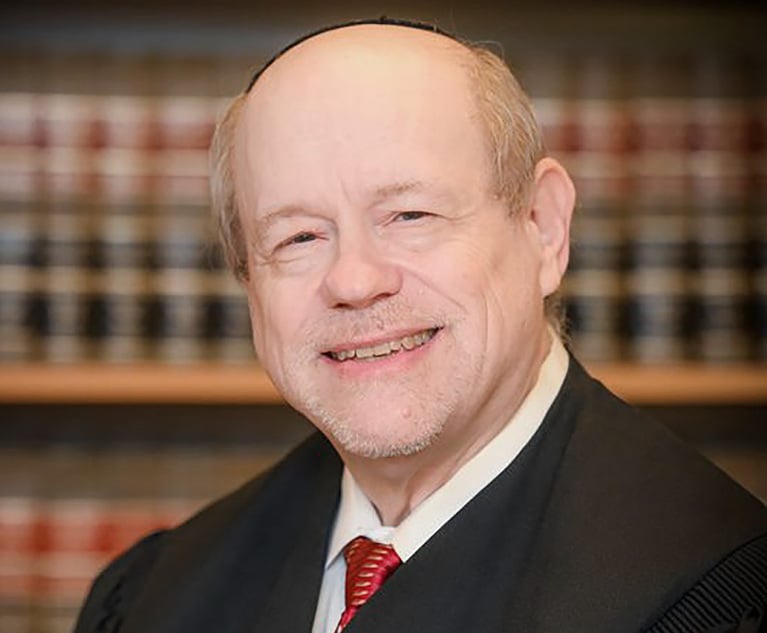Appeals Court Tosses Charges Against Suffolk County Pharmacist in HIV Drug Scheme
A four-judge panel said that the state Attorney General's Office failed to present sufficient evidence to convict the pharmacist.
January 24, 2019 at 04:59 PM
5 minute read
 Pharmacist/photo by Fotolia
Pharmacist/photo by Fotolia
A state appeals court has tossed out eight of 10 convictions for a Suffolk County pharmacist sentenced to prison in 2016 for taking part in a scheme to sell black-market prescription drugs used for treating HIV to patients.
A four-judge panel from the Brooklyn-based Appellate Division, Second Department on Wednesday said that the state Attorney General's Office failed to present sufficient evidence to convict pharmacist Ira Gross with first-degree grand larceny, first-degree criminal diversion of prescription medication, three counts of first-degree money laundering and related charges.
Gross was sentenced to six years in prison for his role in the operation, in which Gross worked as an intermediary between Glenn Schabel, the supervising pharmacist at the now-rebranded MOMS Pharmacy in Melville, and Stephen Costa, a distributor that was moving HIV anti-retroviral medication purchased through the black market and treated to remove labeling from medication bottles.
Writing for the appeals court, Justice Sandra Sgroi said Schabel, a high-ranking employee at the pharmacy, knew it was illegal to sell the diverted medications—thus, by imputation, so did the pharmacy.
Therefore, Sgroi said, prosecutors failed to prove a key element for grand larceny, a class B felony and the top count in the indictment against Gross: that he used false representation to bilk the pharmacy out of money.
Justices William Mastro, Cheryl Chambers and Joseph Maltese joined Sgroi on the unanimous decision.
Gross' lawyer, John Martin of Garfunkel Wild, said his client was a middleman in the scheme and that prosecutors presented “zero evidence” that any patients were harmed by drugs sold as part of the scheme.
“I think the AG's office, like the jury, decided they didn't like my client and just decided to hurt him as much as they could and they weren't careful with the law,” Martin said.
The Attorney General's Office did not respond to requests for comment. Assistant Attorneys General Nikki Kowalski and James Gibbons appeared for the Attorney General's Office.
As for Gross' conviction on a charge of criminal diversion of prescription meds, an offense created under a statute that has been applied very few times since it was enacted in 1995, Sgroi said the offense doesn't apply to Gross' conduct because the law applies to patients selling their medications on the street and their customers.
The panel preserved Gross' convictions of second-degree money laundering and first-degree commercial bribery and vacated the sentences associated with the dismissed charges. Martin said though that, given the dismissed charges, his client should be eligible for release.
The cocktail of drugs used to treat HIV and AIDS patients can cost between $3,000 and $4,000, according to the Second Department's ruling, though patients on Medicaid pay much less if anything at all for the meds and can sell them on the street for below market value.
An expert witness for the prosecution testified that meds that leave the legitimate distribution system are deemed adulterated and should not be resold, as there is no way to determine if the diverted meds are safe or effective.
The diverted meds that passed through Costa's distribution centers were resold at MOMS Pharmacy locations; about $154 million of the costs for the resold meds were billed to New York's Medicaid program, according to a news release from the Attorney General's Office.
While the operation was running from 2008 to 2012, a total of $274 million worth of diverted HIV drugs were sold, of which Gross made a $25.2 million cut, according to a news release from the Attorney General's Office.
After word of the scheme reached the Attorney General's Office, the office's Medicaid Fraud Control unit launched an investigation and the office obtained wiretaps for Gross and Costa's cellphones and listened in to their calls with each other and calls between Gross and Schabel.
Schabel pleaded guilty in 2016 to criminal prescription medication diversion and commercial bribery and was also sentenced to prison. Costa pleaded guilty to providing Gross with technical assistance.
Gross is appealing the civil forfeiture action in the case, for which a Second Department panel heard oral arguments on Thursday.
Read more:
Walgreens Agrees to $269M Payment to Settle Health Care Fraud Suits
NY DAs Ask Cuomo to Fund More Videotaped Interrogations, Body Cameras
Health Insurance Fraud: A Key Focus of State and Federal Prosecutors
This content has been archived. It is available through our partners, LexisNexis® and Bloomberg Law.
To view this content, please continue to their sites.
Not a Lexis Subscriber?
Subscribe Now
Not a Bloomberg Law Subscriber?
Subscribe Now
NOT FOR REPRINT
© 2025 ALM Global, LLC, All Rights Reserved. Request academic re-use from www.copyright.com. All other uses, submit a request to [email protected]. For more information visit Asset & Logo Licensing.
You Might Like
View All
Decision of the Day: Qui Tam Relators Do Not Plausibly Claim Firm Avoided Tax Obligations Through Visa Applications, Circuit Finds

'Serious Legal Errors'?: Rival League May Appeal Following Dismissal of Soccer Antitrust Case
6 minute read
Decision of the Day: Judge Sanctions Attorney for 'Frivolously' Claiming All Nine Personal Injury Categories in Motor Vehicle Case

Trending Stories
- 1Trump Administration Faces Lawsuit Over USAID Stop-Work Orders
- 2Legaltech Rundown: Davis Wright Tremaine Announces CodeX Partnership, AAA Brings on Maya Markovich as VP, and More
- 3State Appellate Court Settles Fee Battle Between Former Co-Counsel in Patent Litigation
- 4Recent Controversial Decision and Insurance Law May Mitigate Exposure for Companies Subject to False Claims Act Lawsuits
- 5Visa Revocation and Removal: Can the New Administration Remove Foreign Nationals for Past Advocacy?
Who Got The Work
J. Brugh Lower of Gibbons has entered an appearance for industrial equipment supplier Devco Corporation in a pending trademark infringement lawsuit. The suit, accusing the defendant of selling knock-off Graco products, was filed Dec. 18 in New Jersey District Court by Rivkin Radler on behalf of Graco Inc. and Graco Minnesota. The case, assigned to U.S. District Judge Zahid N. Quraishi, is 3:24-cv-11294, Graco Inc. et al v. Devco Corporation.
Who Got The Work
Rebecca Maller-Stein and Kent A. Yalowitz of Arnold & Porter Kaye Scholer have entered their appearances for Hanaco Venture Capital and its executives, Lior Prosor and David Frankel, in a pending securities lawsuit. The action, filed on Dec. 24 in New York Southern District Court by Zell, Aron & Co. on behalf of Goldeneye Advisors, accuses the defendants of negligently and fraudulently managing the plaintiff's $1 million investment. The case, assigned to U.S. District Judge Vernon S. Broderick, is 1:24-cv-09918, Goldeneye Advisors, LLC v. Hanaco Venture Capital, Ltd. et al.
Who Got The Work
Attorneys from A&O Shearman has stepped in as defense counsel for Toronto-Dominion Bank and other defendants in a pending securities class action. The suit, filed Dec. 11 in New York Southern District Court by Bleichmar Fonti & Auld, accuses the defendants of concealing the bank's 'pervasive' deficiencies in regards to its compliance with the Bank Secrecy Act and the quality of its anti-money laundering controls. The case, assigned to U.S. District Judge Arun Subramanian, is 1:24-cv-09445, Gonzalez v. The Toronto-Dominion Bank et al.
Who Got The Work
Crown Castle International, a Pennsylvania company providing shared communications infrastructure, has turned to Luke D. Wolf of Gordon Rees Scully Mansukhani to fend off a pending breach-of-contract lawsuit. The court action, filed Nov. 25 in Michigan Eastern District Court by Hooper Hathaway PC on behalf of The Town Residences LLC, accuses Crown Castle of failing to transfer approximately $30,000 in utility payments from T-Mobile in breach of a roof-top lease and assignment agreement. The case, assigned to U.S. District Judge Susan K. Declercq, is 2:24-cv-13131, The Town Residences LLC v. T-Mobile US, Inc. et al.
Who Got The Work
Wilfred P. Coronato and Daniel M. Schwartz of McCarter & English have stepped in as defense counsel to Electrolux Home Products Inc. in a pending product liability lawsuit. The court action, filed Nov. 26 in New York Eastern District Court by Poulos Lopiccolo PC and Nagel Rice LLP on behalf of David Stern, alleges that the defendant's refrigerators’ drawers and shelving repeatedly break and fall apart within months after purchase. The case, assigned to U.S. District Judge Joan M. Azrack, is 2:24-cv-08204, Stern v. Electrolux Home Products, Inc.
Featured Firms
Law Offices of Gary Martin Hays & Associates, P.C.
(470) 294-1674
Law Offices of Mark E. Salomone
(857) 444-6468
Smith & Hassler
(713) 739-1250






